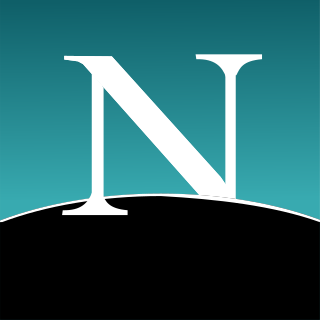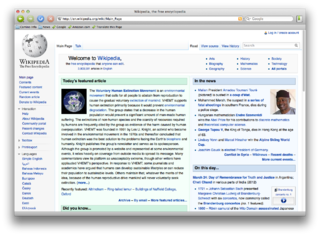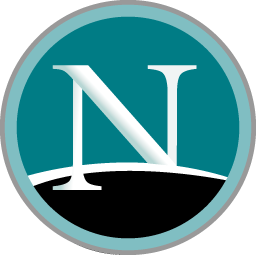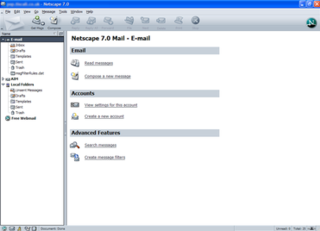
Netscape Navigator is a discontinued proprietary web browser, and the original browser of the Netscape line, from versions 1 to 4.08, and 9.x. It was the flagship product of the Netscape Communications Corp and was the dominant web browser in terms of usage share in the 1990s, but by around 2003 its user base had all but disappeared. This was partly because the Netscape Corporation did not sustain Netscape Navigator's technical innovation in the late 1990s.
Netscape Communications Corporation was an American independent computer services company with headquarters in Mountain View, California, and then Dulles, Virginia. Its Netscape web browser was once dominant but lost to Internet Explorer and other competitors in the so-called first browser war, with its market share falling from more than 90 percent in the mid-1990s to less than one percent in 2006. An early Netscape employee, Brendan Eich, created the JavaScript programming language, the most widely used language for client-side scripting of web pages. A founding engineer of Netscape, Lou Montulli, created HTTP cookies. The company also developed SSL which was used for securing online communications before its successor TLS took over.
Gecko is a browser engine developed by Mozilla. It is used in the Firefox browser, the Thunderbird email client, and many other projects.

Beonex Communicator is a discontinued open-source Internet suite based on the Mozilla Application Suite (MAS) by Ben Bucksch, a German Mozilla developer. It was intended to have a higher security and privacy level than other commercial products. The Internet suite contains a Web browser, an email and news client, an HTML editor and an IRC client.

Netscape Communicator is a discontinued Internet suite produced by Netscape Communications Corporation, and was the fourth major release in the Netscape line of browsers. It was first in beta in 1996 and was released in June 1997. Netscape Communicator addressed the problem of Netscape Navigator 3.x being used as both the name of the suite and the browser contained within it by renaming the suite to Netscape Communicator. It included more groupware features intended to appeal to enterprises.

Camino is a discontinued free, open source, GUI-based Web browser based on Mozilla's Gecko layout engine and specifically designed for the OS X operating system. In place of an XUL-based user interface used by most Mozilla-based applications, Camino used Mac-native Cocoa APIs. On May 30, 2013, the Camino Project announced that the browser is no longer being developed.

Netscape 6 is a discontinued Internet suite developed by Netscape Communications Corporation, and was the sixth major release of the Netscape series of browsers. It superseded Netscape Communicator (4.x), as the release of Netscape Communicator 5 was scrapped. Netscape 6 was the first browser of the Netscape line to be based on another source code: Mozilla Application Suite, an open-source software package from the Mozilla Foundation, which was created by Netscape in 1998.
This is a comparison of both historical and current web browsers based on developer, engine, platform(s), releases, license, and cost.

Netscape Browser is the eighth major release of the Netscape series of web browsers, now all discontinued. It was published by AOL, but developed by Mercurial Communications, and originally released for Windows on May 19, 2005.

SeaMonkey is a free and open-source Internet suite. It is the continuation of the former Mozilla Application Suite, based on the same source code, which itself grew out of Netscape Communicator and formed the base of Netscape 6 and Netscape 7.
The history of the Mozilla Application Suite began with the release of the source code of the Netscape suite as an open source project. Going through years of hard work, Mozilla 1.0 was eventually released on June 5, 2002. Its backend code base, most notably the Gecko layout engine, has become the foundation of a number of applications based on Mozilla, including the Mozilla Foundation's flagship product Mozilla Firefox and Mozilla Thunderbird. While the suite is no longer a formal Mozilla product, its development and maintenance is continued as the SeaMonkey community project.

The Mozilla Application Suite is a discontinued cross-platform integrated Internet suite. Its development was initiated by Netscape Communications Corporation, before their acquisition by AOL. It was based on the source code of Netscape Communicator. The development was spearheaded by the Mozilla Organization from 1998 to 2003, and by the Mozilla Foundation from 2003 to 2006.
The Mozilla application framework is a collection of cross-platform software components that make up the Mozilla applications. It was originally known as XPFE, an abbreviation of cross-platform front end. It was also known as XPToolkit. To avoid confusion, it is now referred to as the Mozilla application framework.

Network Security Services (NSS) is a collection of cryptographic computer libraries designed to support cross-platform development of security-enabled client and server applications with optional support for hardware TLS/SSL acceleration on the server side and hardware smart cards on the client side. NSS provides a complete open-source implementation of cryptographic libraries supporting Transport Layer Security (TLS) / Secure Sockets Layer (SSL) and S/MIME. NSS releases prior to version 3.14 are tri-licensed under the Mozilla Public License 1.1, the GNU General Public License, and the GNU Lesser General Public License. Since release 3.14, NSS releases are licensed under GPL-compatible Mozilla Public License 2.0.

The Netscape web browser is the general name for a series of web browsers formerly produced by Netscape Communications Corporation, which eventually became a subsidiary of AOL. The original browser was once the dominant browser in terms of usage share, but as a result of the first browser war, it lost virtually all of its share to Internet Explorer due to Microsoft's anti-competitive bundling of Internet Explorer with Windows.

Netscape Navigator 9 is a discontinued web browser that was produced by the Netscape Communications division of parent AOL, first announced on January 23, 2007. It was the ninth major release of the Netscape line of browsers. After AOL outsourced the development of Netscape Browser 8 to Mercurial Communications in 2004, Netscape Navigator 9 marked the first Netscape browser to be produced in-house since the Netscape 7 suite. It also saw the return of the classic Navigator name, which was previously used during Netscape's heyday between versions 1.0 and 4.08 in the 1990s. Netscape Navigator 9 is based on Mozilla Firefox 2.0.

Netscape Mail and Newsgroups, commonly known as just Netscape Mail, was an email and news client produced by Netscape Communications Corporation as part of the Netscape series of suites between versions 2.0 to 7.2. In the 2.x and 3.x series, it was bundled with the web browser. In the 4.x series, it was rewritten as two separate programs known as Netscape Messenger and Netscape Collabra.
Mozilla is a free software community founded in 1998 by members of Netscape. The Mozilla community uses, develops, publishes and supports Mozilla products, thereby promoting exclusively free software and open standards, with only minor exceptions. The community is supported institutionally by the non-profit Mozilla Foundation and its tax-paying subsidiary, the Mozilla Corporation.









